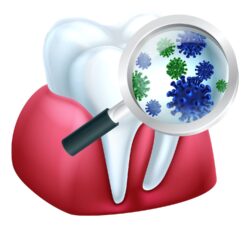Gum disease refers to a relatively common infection in the gum tissue. It can begin with inflamed gums, but as it advances, bacteria can eat away at the structure of your teeth, gums, and jawbone.
This can result in irreversible dental damage. You can reduce your risk of this infection with good oral hygiene. But some dental patients have a greater danger of forming gum problems than others, even with diligent oral health care. Read on to find three of the factors that could increase your chances of contracting gum disease.

3 Contributors of Gum Disease Formation
Aggressive Oral Bacteria
Your mouth naturally contains bacteria, but some dental patients can form particularly aggressive types of bacteria. The cause of this remains unclear, but the consequences can be grave and unpleasant.
In the face of this aggressive bacteria, your typical oral hygiene routine might not be enough to keep your smile safe from gum disease and other dental problems. The dentist can help you form an individualized care plan that will suit your specific dental needs, keeping your smile safe. For instance, they may recommend that you use an antibacterial rinse to balance oral bacteria and therefore lower the chances of it spreading and hurting your oral health.
Proper oral hygiene overall can help you maintain good gum health. But your dentist can help you find additional advice to keep oral infections at bay.
Underlying Health Conditions
Age, certain medications, and other health-related factors can influence your gum health. For instance, adults over age 65 can notice a 70% higher risk of contracting gum disease according to the American Academy of Periodontology.
Heart disease, arthritis, and diabetes are chronic illnesses that can create inflammation throughout the body. This can link with and worsen gum inflammation, meaning you can see worse symptoms related to periodontal disease.
Pregnancy and fluctuating hormones are more acute health conditions, but they can still impact your gum health, making the gum tissue more prone to infection. Discuss your medical history with your dentist to ensure you maximize preventative care treatment for your gums.
Poor Oral Habits
Your lifestyle and chronic behaviors will affect your oral health, including your gums, as well. Smoking or chewing tobacco will slow tissue healing within the mouth, putting your gums at risk of infection.
Your diet will also play a role in the well-being of your gums. So make sure you eat nutritious foods with plenty of vitamin C that will boost your immune system, making it better able to fight infections like gum disease.
Even if you complete oral hygiene as often as you should, you could still put your gums in danger if you do not use proper cleaning techniques. Do not rush through brushing and flossing your teeth. And use purposeful movements to get your smile effectively clean.
Otherwise, lingering food particles and plaque will lead to bacterial spread through the mouth which could then harm your gums. Attend routine teeth cleanings to maximize oral hygiene and preventative dentistry.
